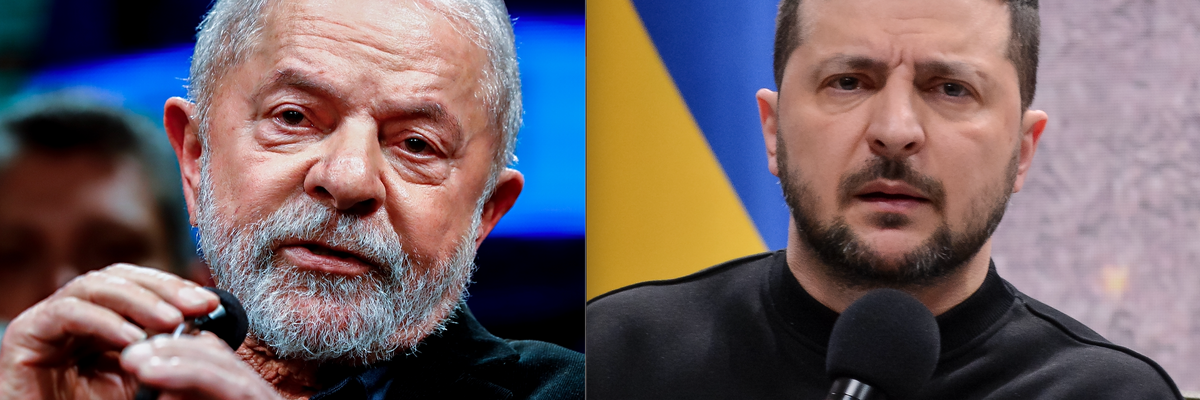Brazil’s President Luiz Inácio Lula da Silva had an eventful few days at last weekend’s G7 summit in Hiroshima, Japan, with one clear takeaway: relations between Brazil and Ukraine are colder now than they were last week. Indeed, one might even conclude that the Brazilian president is now giving up on the prospect of contributing to a formal peace between Russia and Ukraine.
Since before taking office in January, Lula has insisted that both Russia and Ukraine should stop fighting and begin discussing peace terms. He has argued for convening a small group of countries — including Brazil, Latin America’s largest nation and the world’s fourth-largest democracy — with no direct involvement in the conflict to mediate negotiations.
This position has been criticized widely for equating Russian and Ukrainian culpability in the ongoing conflagration and indicating a tacit endorsement of Russia’s position that the war resulted from years of NATO-led provocations on its Western flank.
Some have called Lula either hopelessly naïve or deeply cynical. The reality, however, is that Lula’s position is rational considering his nation’s interests. As Oliver Stuenkel, an associate professor of international relations at the Getulio Vargas Foundation in São Paulo, wrote in a recent piece, “while it is tempting to dismiss Lula’s quest for peace in Ukraine as quixotic, Brazil’s assertiveness reveals broader misgivings across the global south about the inclusiveness of the supposedly liberal international order.”
With this stance clearly expressed, Celso Amorim, Lula’s former foreign minister and closest adviser on international affairs, visited Ukraine earlier this month after having previously traveled to Russia. While Ukraine’s deputy minister of foreign affairs tweeted: “We are slowly changing the mood between Ukraine and Brazil” (he included a wink emoji, signaling either confidence or irony), Brazil hasn’t appeared to change its position in the days after that trip. The Ukrainians invited Lula to visit but he has yet to accept the offer and there has been very little reported communication between Brazilian and Ukrainian officials. This is why President Volodymyr Zelensky’s sudden arrival at the G7 summit on Saturday — a visit "decided in haste and kept secret until the last moment,” according to Le Monde — was such an intriguing diplomatic development. Would he and Lula finally sit down together?
Ultimately, they would not. As Zelensky entered the room where heads of state were gathered on Sunday, footage shows several leaders approaching to greet him. Lula, eyes fixed on a piece of paper in his hand, did not get up. Many on social media and beyond interpreted this as a slight, but it is not out of character for Lula.
During a visit to the G8 summit in 2003, his first as president, Lula remained seated while others stood as President George W. Bush entered the room. “Nobody got up when I walked in,” he later recalled, “so I wouldn't stand for anyone else.” Zelensky would go on to hold private meetings with most of the assembled heads of state. He apparently got no firm response from the Brazilians for hours. Finally, Lula scheduled a talk for Sunday at 3:15 p.m., but when the time came, he claims Zelensky stood him up. When asked afterward if he was disappointed that he didn’t meet with Lula, Zelensky replied tersely, a wry smirk crossing his face: “I think he was disappointed.”
For his part, Lula insisted that his team had set the meeting but was told at the agreed upon time that Zelensky would be late. Lula then met with the Vietnamese president for an hour during which, he said, the Ukrainian never showed. “That's what happened. That is, if he had a more serious problem, a more important meeting, I don’t know.”
Responding to Zelensky’s quip about him being disappointed, Lula said he was not disappointed but upset at the missed opportunity. “But look,” he concluded, “Zelensky is over-age. He knows what he's doing.”
The broader dynamics that Lula has been criticizing for months remain unchanged, as he noted, with neither Zelensky nor Putin serious about an immediate ceasefire. Biden, Lula said, “doesn't talk about peace,” insisting instead on unilateral Russian surrender, an approach that “doesn’t help” end the conflict. The Brazilian president reiterated his condemnation of Russian’s invasion of Ukraine’s sovereignty and his recognition that Ukraine has the right to defend itself but wondered, "how long will this go?"
Overall, the G7’s attempts to more prominently feature major players from beyond the richest democratic nations produced little substance. As Max Lawson, head of Inequality Policy at Oxfam, put it, “if the G7 really want closer ties to the developing countries and greater backing from them for the war in Ukraine, then asking Global South leaders to fly across the world for a couple of hours is not going to cut it,” adding that “they need to cancel debts and do what it takes to end hunger.”
With no clear breakthrough, Lula said he is happy to visit Ukraine if it means traveling to Russia shortly thereafter to talk peace. That prospect is unfortunately not in the offing, as Lula surely knows. Neither, it seems, is Brazilian mediation to help end the war. It is a sad day in global geopolitics when personal squabbles color momentous decisions of life and death.















